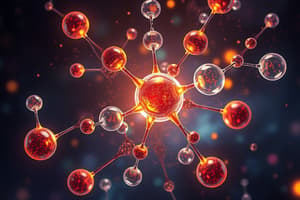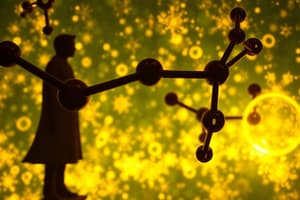Podcast
Questions and Answers
Which of the following fields require a basic knowledge of organic chemistry? (Select all that apply)
Which of the following fields require a basic knowledge of organic chemistry? (Select all that apply)
- Pharmaceutical industry (correct)
- Fashion design
- Biotechnology (correct)
- Marine biology
What is the best definition of Organic Chemistry?
What is the best definition of Organic Chemistry?
The chemistry of hydrocarbons and their derivatives.
CO2 is considered an organic compound.
CO2 is considered an organic compound.
False (B)
A hydrocarbon is a compound of _____ and _____
A hydrocarbon is a compound of _____ and _____
Match the following elements with their atomic number:
Match the following elements with their atomic number:
Flashcards are hidden until you start studying
Study Notes
Introduction to Organic Chemistry
- Organic chemistry is integral to everyday life and various professional fields, including chemistry, bioscience, medicine, and environmental sciences.
- Essential for industries such as pharmaceuticals, molecular biology, biochemistry, biotechnology, polymer science, petrochemicals, textiles, adhesives, resins, and dyes.
Definition and Scope
- Focuses on carbon compounds, excluding some exceptions like CO2 and Na2CO3.
- Best defined as the chemistry of hydrocarbons and their derivatives.
- Hydrocarbons consist solely of carbon and hydrogen; derivatives include compounds derived from hydrocarbons.
Fundamental Concepts in Chemistry
- Chemistry is termed a "central science" that studies matter, its composition, structure, properties, and the changes it undergoes during reactions.
Common Elements in Organic Compounds
- Hydrogen (H), Carbon (C), Nitrogen (N), Oxygen (O), and Fluorine (F) are majorly involved in organic compounds.
Key Properties of Elements in Organic Chemistry
- Hydrogen: Atomic Number 1, exists as a gas (H2), electron configuration of 1s¹, has isotopes H, 2H, and 3H.
- Carbon: Atomic Number 6, solid state, with electron configuration 1s² 2s² 2p² or [He] 2s² 2p², isotopes include ¹²C, ¹³C, and ¹⁴C.
- Nitrogen: Atomic Number 7, gas (N2), electron configuration 1s² 2s² 2p³ or [He] 2s² 2p³, with isotopes like ¹⁴N.
- Oxygen: Atomic Number 8, gas (O2), electron configuration 1s² 2s² 2p⁴ or [He] 2s² 2p⁴, isotopes include ¹⁶O and ¹⁸O.
- Fluorine: Atomic Number 9, gas (F2), electron configuration 1s² 2s² 2p⁵ or [He] 2s² 2p⁵, with isotopes like ¹⁹F.
Summary of Periodic Table Elements in Organic Chemistry
- The elements listed mainly belong to groups 1, 2, and 14-18, displaying unique properties crucial for understanding organic reactions and structures.
Studying That Suits You
Use AI to generate personalized quizzes and flashcards to suit your learning preferences.




